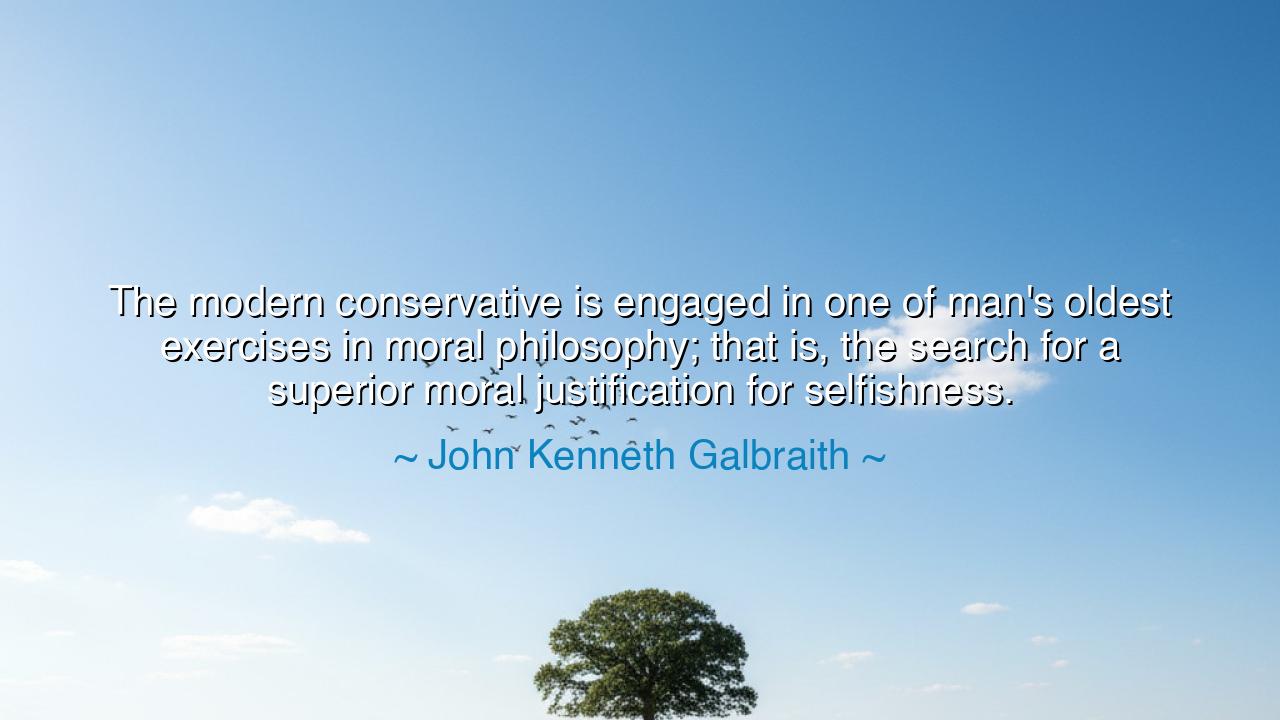
The modern conservative is engaged in one of man's oldest
The modern conservative is engaged in one of man's oldest exercises in moral philosophy; that is, the search for a superior moral justification for selfishness.






The words of John Kenneth Galbraith, “The modern conservative is engaged in one of man’s oldest exercises in moral philosophy; that is, the search for a superior moral justification for selfishness,” resound like a thunderclap against the walls of complacency. In them, Galbraith unmasks a pattern as old as civilization itself: the powerful cloaking their own interests in the garb of virtue. He declares that what appears as lofty moral philosophy is often little more than a mask for greed, a justification for keeping what one has while denying others their share.
In the ancient spirit, this truth is eternal. Kings claimed divine right not merely to rule, but to hold wealth and privilege above their subjects. Slaveholders wrapped their cruelty in arguments of “order” and “natural law.” The oppressor rarely says, “I am selfish.” Instead, he says, “I am righteous.” Thus, Galbraith’s words strike at hypocrisy, exposing how selfishness, when dressed as morality, is more dangerous than naked greed—for it deceives both the oppressor and the oppressed.
Consider the tale of the Gilded Age in America. Industrial magnates amassed vast fortunes, while workers toiled in poverty. Yet these barons defended their wealth with the philosophy of Social Darwinism, claiming that the rich thrived because of superior virtue and the poor suffered because of weakness. Their selfishness was shrouded in the language of natural law and moral order, making exploitation appear not only acceptable but righteous. This is the very exercise Galbraith condemns: the eternal hunt for noble excuses to justify inequality.
Yet history also shows that such masks cannot last forever. The French Revolution erupted when the aristocracy, claiming divine sanction, hoarded wealth while the people starved. Their “moral justification” for privilege collapsed when confronted by hunger and fury. The selfishness they called sacred was revealed as corruption, and the people tore down the order that had long oppressed them. Here, too, Galbraith’s wisdom proves true: selfishness disguised as morality is among the oldest, and most fragile, of lies.
So let this teaching endure: beware those who speak loudly of principle, yet act only in the service of their own gain. For their words are not wisdom but camouflage. Galbraith’s warning is not only against conservatives, but against all who twist philosophy to sanctify greed. True morality is not found in the justification of selfishness, but in the pursuit of justice, compassion, and the common good. And when the people learn to see through the mask, selfishness loses its throne, and truth takes its rightful place.






AAdministratorAdministrator
Welcome, honored guests. Please leave a comment, we will respond soon